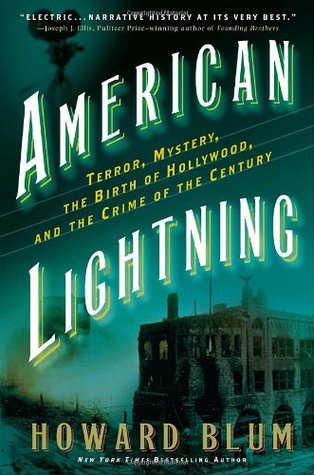 Okay, I'm going to come out and say it: this book was kind of a drag. Especially for a book that promises to be about "Terror, Mystery, the Birth of Hollywood, and the Crime of the Century." Ostensibly, it's about the bombing of the Los Angeles Times building, the bombings that came before and after it, the hunt for the criminals, the trial...and a guy who makes movies? What? Where the connection? Well, here's the answer: there isn't one.
Okay, I'm going to come out and say it: this book was kind of a drag. Especially for a book that promises to be about "Terror, Mystery, the Birth of Hollywood, and the Crime of the Century." Ostensibly, it's about the bombing of the Los Angeles Times building, the bombings that came before and after it, the hunt for the criminals, the trial...and a guy who makes movies? What? Where the connection? Well, here's the answer: there isn't one.Now, that's not 100% true. The private detective who worked on the bombings knew the guy who made the movies. But still. The movies weren't actually about the bombings, they were just about social events that occurred around the same time, and in a very vague sort of way--putting the two directly together is a very tenuous connection at best, and trying to tie it together with "But they saw each other in a hotel at the end of it!!!" doesn't really lend the connection any credence. And with the book relying on such a tenuous connection, it was on shaky ground to start with.
Blum focuses on three main figures in this book: Billy Burns, a private inspector; Clarence Darrow, a lawyer; and D. W. Griffith, the filmmaker. But for most of the book, only Burns is actually relevant, as he and other inspectors from his company attempt to find out who are behind the bombings that are sweeping the nation. A startling string of domestic terrorist attacks, the bombings sprung from the ongoing battle of union workers vs. businesses, but initially no one was sure which side was actually doing the bombing. Was it the unions, trying to get back at businesses who were against unions? Or was it the businesses themselves, trying to frame the unions? Meanwhile, Blum intersperses chapters about Darrow and Griffith just...being themselves. Lawyering. Having affairs. Making movies. It's incredibly boring and served no purpose. Griffith's line isn't necessary at all and certainly doesn't play into "the birth of Hollywood" as his movies were made in New York and he wasn't even the first person to film a big movie. Darrow becomes necessary to the story, but not until the very end, and even then it seems like Blum greatly inflated his role in the story, especially given the way the investigation and trial ended.
The writing is bland and it's hard to determine what's actually pulled from research and what's conjecture, especially in the realm of conversations that occurred. There always seemed like suddenly there was going to be a turning point, a new sight of depths...but then that point never actually developed. There were some interesting parts, mainly when Blum actually focused on the investigations, but for the most part this was a very "meh" book. For a good read about an investigation surrounding a crime closely linked to social issues, I would recommend American Fire or Killers of the Flower Moon--the first is set in the 2010s, the second in the 1920s. They are both excellent and far outshone this one.
2 stars out of 5.
No comments:
Post a Comment